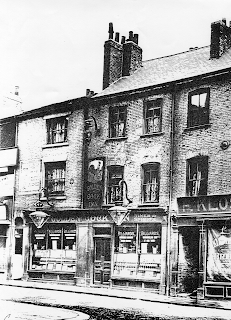 |
| Joseph Ogle's bookshop "at the sign of the dial" |
The building on the right hand side of this picture would have been a familiar haunt of Joseph Priestley. In 1768 it was the bookshop and home of Joseph Ogle, a bookseller, and of his wife Hannah and their children. It was to be found in Kirkgate End, Leeds, and was "at the sign of the dial". Priestley was a great reader and collector of books and it is likely he would have been a frequent visitor to all the town's bookshops. But Ogle's bookshop had an additional attraction for him. It was here on the first floor above the shop that the Leeds Circulating Library opened on 1 November 1768. Joseph Ogle was the library's first librarian and Joseph Priestley was its first secretary.
The first example in England of a library like the one in Leeds was the Liverpool Library founded in 1758. The Leeds Circulating Library was modelled on that in Liverpool. Such libraries were common through Britain by the early 19th century. They provided new books for present members to read and they collected those books to build a permanent library of increasing value for future readers. It was quite expensive - a guinea joining fee and five shillings annual subscription in Leeds in 1768 - but books were also expensive and these libraries appeared long before there were free public libraries. The Leeds Circulating Library still exists though most of its contemporaries have long since disappeared. It is today known as The Leeds Library and is to be found in Commercial Street.
Thomas Dunham Whitaker in his history of Leeds (Loidis and Elmete, Leeds: Robinson, Son & Hernaman, 1816) said the library's original premises "at the sign of the dial" were "in a dark and incommodious garret in a backyard". In the early 19th century, the building that had once housed the library and Ogle's bookshop was combined with the Golden Cock public house (to the left in the picture above but now rebuilt in brick) to make a larger, double-fronted premises. This public house closed in the early 1960s. Today the site is occupied by the Superdrug shop though a golden cock in relief may still be seen above.
The first example in England of a library like the one in Leeds was the Liverpool Library founded in 1758. The Leeds Circulating Library was modelled on that in Liverpool. Such libraries were common through Britain by the early 19th century. They provided new books for present members to read and they collected those books to build a permanent library of increasing value for future readers. It was quite expensive - a guinea joining fee and five shillings annual subscription in Leeds in 1768 - but books were also expensive and these libraries appeared long before there were free public libraries. The Leeds Circulating Library still exists though most of its contemporaries have long since disappeared. It is today known as The Leeds Library and is to be found in Commercial Street.
Thomas Dunham Whitaker in his history of Leeds (Loidis and Elmete, Leeds: Robinson, Son & Hernaman, 1816) said the library's original premises "at the sign of the dial" were "in a dark and incommodious garret in a backyard". In the early 19th century, the building that had once housed the library and Ogle's bookshop was combined with the Golden Cock public house (to the left in the picture above but now rebuilt in brick) to make a larger, double-fronted premises. This public house closed in the early 1960s. Today the site is occupied by the Superdrug shop though a golden cock in relief may still be seen above.

For further information about the Leeds Library visit: www.theleedslibrary.org.uk


